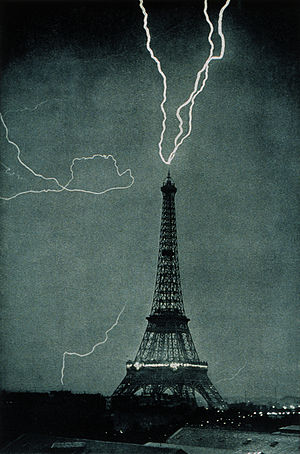Portal:Weather
The weather portal
Weather is the state of the atmosphere, describing for example the degree to which it is hot or cold, wet or dry, calm or stormy, clear or cloudy. On Earth, most weather phenomena occur in the lowest layer of the planet's atmosphere, the troposphere, just below the stratosphere. Weather refers to day-to-day temperature, precipitation, and other atmospheric conditions, whereas climate is the term for the averaging of atmospheric conditions over longer periods of time. When used without qualification, "weather" is generally understood to mean the weather of Earth.
Weather is driven by air pressure, temperature, and moisture differences between one place and another. These differences can occur due to the Sun's angle at any particular spot, which varies with latitude. The strong temperature contrast between polar and tropical air gives rise to the largest scale atmospheric circulations: the Hadley cell, the Ferrel cell, the polar cell, and the jet stream. Weather systems in the middle latitudes, such as extratropical cyclones, are caused by instabilities of the jet streamflow. Because Earth's axis is tilted relative to its orbital plane (called the ecliptic), sunlight is incident at different angles at different times of the year. On Earth's surface, temperatures usually range ±40 °C (−40 °F to 104 °F) annually. Over thousands of years, changes in Earth's orbit can affect the amount and distribution of solar energy received by Earth, thus influencing long-term climate and global climate change.
Surface temperature differences in turn cause pressure differences. Higher altitudes are cooler than lower altitudes, as most atmospheric heating is due to contact with the Earth's surface while radiative losses to space are mostly constant. Weather forecasting is the application of science and technology to predict the state of the atmosphere for a future time and a given location. Earth's weather system is a chaotic system; as a result, small changes to one part of the system can grow to have large effects on the system as a whole. Human attempts to control the weather have occurred throughout history, and there is evidence that human activities such as agriculture and industry have modified weather patterns.
Studying how the weather works on other planets has been helpful in understanding how weather works on Earth. A famous landmark in the Solar System, Jupiter's Great Red Spot, is an anticyclonic storm known to have existed for at least 300 years. However, the weather is not limited to planetary bodies. A star's corona is constantly being lost to space, creating what is essentially a very thin atmosphere throughout the Solar System. The movement of mass ejected from the Sun is known as the solar wind. (Full article...)
Selected article
Snow events are a rarity in the U.S. state of Florida, as freezing temperatures in the state are generally caused by the cold and dry winds of anticyclones. Most of the state is in a rare portion of the continental United States which receives a mean maximum monthly snowfall amount of zero, the only other such areas being southern Texas and California. However, snow does occur, especially in the northern interior sections of the state, sometimes more than once in a season. Areas near Jacksonville have seen several inches of snow on occasion, and snow flurries have been reported as far south as Homestead. Generally, for snow to occur, the polar jet stream must move southward through Texas and into the Gulf of Mexico, with a stalled cold front across the southern portion of the state curving northeastward to combine freezing air into the frontal clouds.

Recently selected articles: Great Lakes Storm, Extratropical cyclone, More...
Did you know (auto-generated) -

- ... that in the 1980s, "Sherman Bonner, The Human Thermometer" presented the weather on an Arkansas TV station?
- ... that Eric Berger wrote about weather for the Houston Chronicle even before he became a certified meteorologist?
- ... that weather whiplash is the phenomenon of rapid swings between extremes of weather conditions?
- ... that after Irish post office clerk Maureen Flavin Sweeney reported worsening weather conditions, Dwight D. Eisenhower agreed to postpone D-Day by 24 hours?
- ... that an attempted British-Norwegian attack on the German battleship Tirpitz was abandoned after two Chariot manned torpedoes were lost due to bad weather?
- ... that extreme event attribution estimates how much climate change causes weather events, such as the 2021 Western North America heat wave?
Selected image

Lightning striking the Eiffel Tower on the night of June 3, 1902. This is one of the earliest photographs of lightning in an urban setting.
Recently selected pictures: Cyclone Catarina, Roll cloud, Hoar frost, More...
More did you know...
...that the Flying river is the name given to the transport of water vapor from the Amazon rainforest to southern Brazil?
...that hurricane shutters are required for all homes in Florida unless impact-resistant glass is used?
...that the Joint Institute for Marine and Atmospheric Research is a combined weather and ocean research institute with the cooperation of the Office of Oceanic and Atmospheric Research and the University of Hawaiʻi?
...that the SS Central America was sunk by a hurricane while carrying more than 30,000 pounds (13,600 kg) of gold, contributing to the Panic of 1857?
...that a hurricane force wind warning is issued by the United States National Weather Service for storms that are not tropical cyclones but are expected to produce hurricane-force winds (65 knots (75 mph; 120 km/h) or higher)?
...that the Automated Tropical Cyclone Forecasting System is a software package for tropical cyclone forecasting developed in 1988 that is still used today by meteorologists in various branches of the US Government?
Recent and ongoing weather
- Wikinews weather portal
- March 26, 2021: Tropical moisture ceases to cause severe floods in South East Australia
- February 19, 2021: Winter storms hammer Texas, fatalities reported
- December 28, 2021: Typhoon Phanfone strikes Philippines
- February 1, 2022: Deadly floods in Brazil after heavy rainfall
- April 15, 2022: South African floods kill at least 300 people
- Weather of 2024
- 2024 Atlantic hurricane season
- 2020–21 North American winter
- 2024 Pacific typhoon season
- Tornadoes of 2024
This week in weather history...
June 5
1934: A tropical storm struck the coast of Belize (then known as British Honduras). The storm would meander through Central America for several days, causing flooding which killed as many as 3,000 people.
June 6
1989: Typhoon Dot made landfall on the island of Samar, Philippines, causing widespread flooding and power outages.
June 7
1993: Levees began to be overtopped, marking the start of the Great Flood of 1993, one of the worst floods in US history.
June 8
1924: Samuel B. Avis, a former member of United States House of Representatives, was struck and killed by lightning in Charleston, West Virginia.
June 9
1998: A severe tropical cyclone made landfall in Gujarat, India, killing an estimated 10,000 people.
June 10
2005: A severe flood struck the town of Shalan in the Heilongjiang province of China, killing more than 100 people.
June 11
2005: Tropical Storm Arlene, the first tropical cyclone of the hyperactive 2005 Atlantic hurricane season, made landfall on the Florida Panhandle.
Selected biography
Tetsuya Theodore Fujita (/fuːˈdʒiːtɑː/; FOO-jee-tah) (藤田 哲也, Fujita Tetsuya, October 23, 1920 – November 19, 1998) was a Japanese-American meteorologist whose research primarily focused on severe weather. His research at the University of Chicago on severe thunderstorms, tornadoes, hurricanes, and typhoons revolutionized the knowledge of each. Although he is best known for creating the Fujita scale of tornado intensity and damage, he also discovered downbursts and microbursts and was an instrumental figure in advancing modern understanding of many severe weather phenomena and how they affect people and communities, especially through his work exploring the relationship between wind speed and damage. (Full article...)
Previously selected biographies: Sakuhei Fujiwhara, Robert Simpson, More...
Related portals
Quality content
Other candidates:
- Featured Article Review: 2005 Atlantic hurricane season (Discussion)
- Featured List Removal Candidate: List of storms in the 2005 Atlantic hurricane season (Discussion)
Subcategories
WikiProjects
The scope of WikiProject Weather is to have a single location for all weather-related articles on Wikipedia.
WikiProject Meteorology is a collaborative effort by dozens of Wikipedians to improve the quality of meteorology- and weather-related articles. If you would like to help, visit the project talk page, and see what needs doing.
WikiProject Severe weather is a similar project specific to articles about severe weather. Their talk page is located here.
WikiProject Tropical cyclones is a daughter project of WikiProject meteorology. The dozens of semi-active members and several full-time members focus on improving Wikipedia's coverage of tropical cyclones.
WikiProject Non-tropical storms is a collaborative project to improve articles related to winter storms, wind storms, and extratropical cyclones.
Wikipedia is a fully collaborative effort by volunteers. So if you see something you think you can improve, be bold and get to editing! We appreciate any help you can provide!
Associated Wikimedia
The following Wikimedia Foundation sister projects provide more on this subject:
-
Commons
Free media repository -
Wikibooks
Free textbooks and manuals -
Wikidata
Free knowledge base -
Wikinews
Free-content news -
Wikiquote
Collection of quotations -
Wikisource
Free-content library -
Wikiversity
Free learning tools -
Wiktionary
Dictionary and thesaurus


































